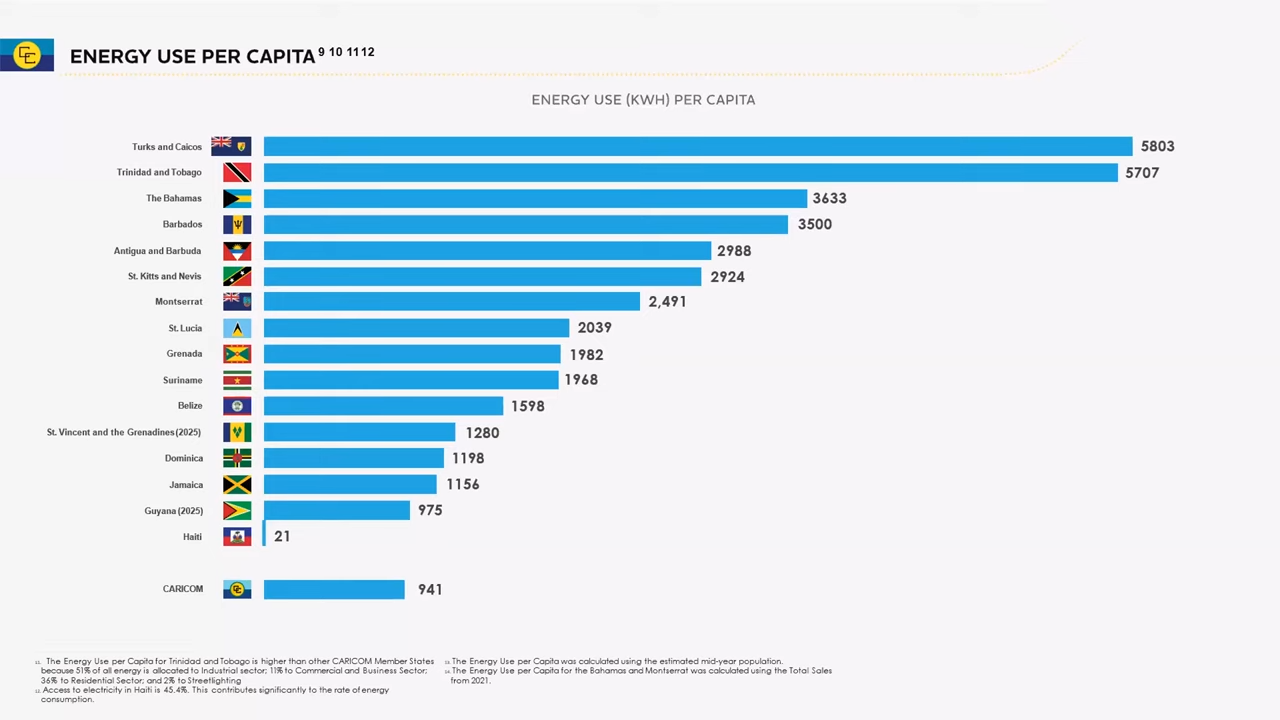
The CARICOM member states have made considerable strides towards achieving their renewable energy (RE) targets, reaching a commendable 12 per cent RE electricity penetration by 2022—nearly halfway to their ambitious goal.
This milestone was highlighted during a recent webinar hosted by The Caribbean Centre for Renewable Energy and Energy Efficiency (CCREEE) on Tuesday, July 30. The event marked the launch of the 2022 CARICOM Energy Report Cards (ERCs), titled “The Success of 12% by 2022.” The CARICOM ERCs provide an overview of the energy sector’s performance across the 15 CARICOM member states and the Turks and Caicos Islands, serving as a vital tool for tracking the region’s energy transition. Since the ERCs’ inception in 2017, they have played a crucial role in assessing progress, encompassing sustainable energy initiatives, policies, technical support, workforce development, and capacity-building efforts.
While CARICOM set an ambitious target of achieving 27 per cent installed renewable energy capacity by 2022 and 47 per cent by 2027, Ayanna Evelyn, Knowledge Management Associate at The CCREEE, revealed that the region has already installed approximately 700 megawatts of renewable energy capacity. This achievement is a testament to the concerted efforts of member states, each of which has established a policy or is in the process of developing one to further advance their renewable energy sectors.
Presenting the report’s findings, Ms. Evelyn acknowledged that while the 2022 target was not fully met, the region’s commitment to renewable energy remains unwavering. “The groundwork has been laid, and we anticipate even more significant progress reflected in the 2023 Energy Report Card, given the positive developments we’re witnessing within the sector,” she noted.
Ms. Evelyn also underscored the region’s immense potential in renewable energy sources, including solar, wind, hydro, geothermal, and biomass, which are key to driving greater resilience and energy security across the Caribbean.
In his remarks, Dr. James Fletcher, Chairman of The CCREEE, emphasised the Caribbean’s role as a leader in global climate action; despite contributing only 0.2 per cent to global greenhouse gas emissions, it suffers the worst effects of climate change. “It is important for us to demonstrate that even being such small producers of greenhouse gas emissions, we are actively working to lower global temperatures back to 1.5 degrees Celsius. It helps with our negotiating within climate change spaces, especially within the United Nations Framework Convention on Climate Change (UNFCCC), demonstrating that we are leading by example,” Dr. Fletcher stated.
Dr. Fletcher also recognised the progress achieved so far, explaining that the ERCs also provide valuable insights into the challenges and opportunities faced by member states as they work towards their energy goals.
Sandra Britton, Programme Manager for Energy at the CARICOM Secretariat, praised the ERCs as essential tools for understanding the current state of the region’s energy sector and for planning a sustainable and resilient future. She affirmed the CARICOM Secretariat’s continued dedication to supporting the region’s energy transition, ensuring that policies and strategies are grounded in robust data and effective planning.
“So, we’re very happy that we have the CARICOM Energy Knowledge Hub (CEKH) at The CCREEE and that they’re collecting most of the energy data so that we would be able to make informed decisions, and we would be able to use the data also in the planning and development of our policies,” Ms. Britton remarked.
Joseph Williams, Sustainable Energy Coordinator at the Caribbean Development Bank, echoed the importance of evidence-based policymaking and performance tracking in energy planning. He highlighted the critical role of ERCs in assessing progress and ensuring that the region meets its reporting obligations to the international community and partners.
Additionally, reporting on St. Kitts and Nevis’ decarbonisation efforts, Denasio Frank, Energy Officer of the Energy Unit, noted that while the dual-island nation has made significant progress toward its targets, work still remains to be done. With an estimated 1280 megawatts of geothermal energy potential and abundant solar energy resources, the dual-island nation is poised for a transformative shift in its energy landscape. Mr. Frank also noted the development of a national grid code to encourage investment in solar energy and the need for an updated energy policy framework that includes provisions for small-scale distributed renewable energy systems and electric vehicles.
Looking towards 2027 and beyond, Cherri-Ann Farquharson, The CCREEE’s Capacity Development and Gender Expert, emphasised the importance of robust policies, regulatory frameworks, and incentives to drive greater investment in renewable energy. She asserted that “CARICOM member states have the natural resources necessary to transform the energy sector into a major economic driver, enhancing regional energy security and improving the quality of life for all Caribbean people.”
Ms. Farquharson emphasised that collaboration is key to our success. “By focusing on regional energy integration, sharing lessons learned, and pooling our capacities and energy resources, we can accelerate our progress and achieve even greater outcomes,” Ms. Farquharson concluded.